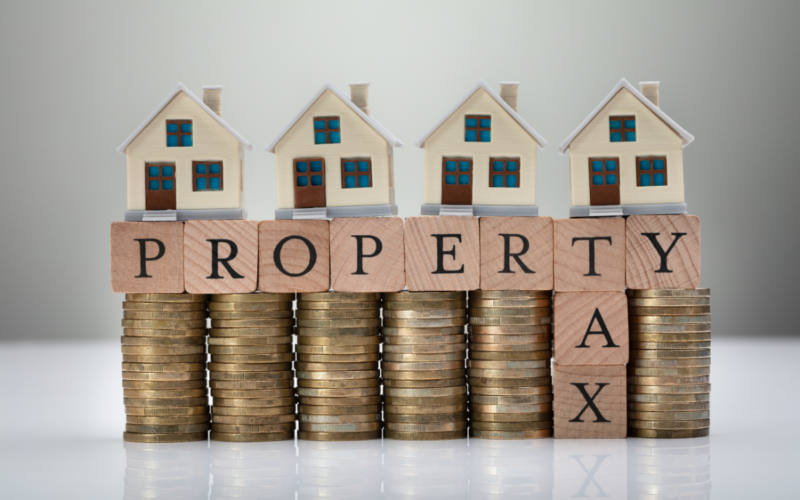Three of the five largest U.S. metro areas in Florida have seen the highest increases in property tax bills since the pandemic began, making it more difficult to afford a home in the Sunshine State, according to recent Redfin research.
In Indianapolis, where the average homebuyer now pays 66.7% more than they would have in 2019, the median monthly property tax payment has increased the greatest during that time, reaching $205. Atlanta is in second place, up 65.8% to $239. Next are three Florida metro areas: Miami (48.1% to $367), Tampa (56.7% to $250), and Jacksonville (59.6% to $228 since 2019), according to a Redfin analysis of property taxes for single-family homes among the 50 most populous U.S. metropolitan areas, as of August 2024.
“Florida was alluring for remote workers during the pandemic because of its relatively affordable housing. Somewhat ironically, the state’s population boom has driven up home prices, and property taxes along with it,” said Elijah de la Campa, Senior Economist at Redfin. “The cost of owning a home has gone from affordable to unaffordable for a lot of local Florida residents and out-of-towners. Home prices that are much higher than in pre-pandemic times and the disaster-driven surge in HOA and insurance costs are now pricing homebuyers out of the market.”
Top 5 Metro Areas Where Property Taxes Have Increased Most Since 2019
| U.S. metro area | Median total monthly housing payment | Median total monthly housing payment, change from 2019 | Median monthly property tax payment | Median monthly property tax payment, change from 2019 |
| Indianapolis | $2,152 | 105.8% | $205 | 66.7% |
| Atlanta | $2,811 | 106.8% | $239 | 65.8% |
| Jacksonville, FL | $2,735 | 99.0% | $228 | 59.6% |
| Tampa, FL | $2,797 | 112.4% | $250 | 56.7% |
| Miami | $4,401 | 125.7% | $367 | 48.1% |
Florida Property Taxes Skyrocket Over the Last Five Years
According to Redfin’s most recent market trend analysis, there are a number of reasons why property taxes in the Sunshine State have increased over the past five years, but why?
- Rising home values: Due in part to the pandemic-driven homebuying boom in the Sunshine State, which saw a large influx of out-of-town buyers driving up prices, Florida’s house values have skyrocketed over the past six months. Assessed home values, which determine property tax bills, are significantly greater than they were before to the pandemic, even though Florida prices have since declined from their peak.
- The increasing frequency and intensity of natural disasters: In order to fund climate-resilience initiatives, Florida raised property tax rates. In jurisdictions without state income taxes, such as Florida and Texas, property taxes are a particularly significant source of funding for government programs.
- Florida’s increasing population: In addition to driving towns to raise taxes, Florida’s growing population has also raised demand for government services like roads and schools, which is influenced by inflation as those facilities are now more expensive than they were in the past.
“The increase in property taxes is the last straw for some prospective buyers,” de la Campa said. “Homebuyers have realized they may save money by paying no income tax, but their property tax bill will increase.”
Demand for Florida Homes Declines Due to Natural Disasters
Because homes are no longer reasonably priced to compensate for increasingly devastating natural disasters, Redfin analysts predict that Florida’s demand for homes will continue to decline.
Fewer people moved into Florida in 2023, as movement into parts of Florida that are susceptible to natural disasters slowed in 2023 compared to past years as people became more aware of the risks–and high costs–associated with living in the state. Hurricane Helene made many Gen Zers and millennials rethink where they want to live. Hurricane Helene and Hurricane Milton may further deter people from living in Florida; a recent Redfin-Ipsos survey found that nearly one-third of young adults are reconsidering where they want to move after seeing or hearing about damage caused by Hurricane Helene.
According to the same survey, 21% of Florida homeowners and renters say that they plan to move within the next year in part because of cheaper property taxes, and 25% say that they are moving because they are worried about local climate concerns or natural catastrophes. Please be aware that this reading is merely suggestive and is based on a sample of 72 Florida residents’ replies. Some 11% of the 904 respondents nationwide who responded to the survey stated that lowering property taxes is one of the reasons they are relocating, while 14% mentioned worries about natural disasters or climate risks in their area.

Metro-Level Highlights: U.S.
Property tax bills are highest in New York and New Jersey and lowest in the Sun Belt region.
- New York and New Jersey homebuyers have the highest property tax bills. Nassau County, NY (Long Island) has the highest median monthly property taxes, in dollars, clocking in at $905. It’s followed by Newark, NJ ($848), New York ($821), San Jose, CA ($782) and New Brunswick, NJ ($706).
- Median monthly property tax bills are lowest in Phoenix ($151), Nashville, TN ($152), Charlotte, NC ($157), Las Vegas ($167) and Detroit ($174). Effective property tax rates are fairly low in those Sun Belt states (under 0.5%), and while rates are higher in Michigan, homes there are inexpensive.
Effective property tax rates are highest in Texas and lowest in the Sun Belt and California.
- Effective property tax rates are highest in Texas. Effective tax rates are highest in Austin, TX (1.8%), followed by Newark, NJ, San Antonio, Houston and Chicago, each of which have a 1.7% rate.
- Effective tax rates are lowest in Nashville, TN, Phoenix, Las Vegas and Charlotte, NC, each with rates of 0.5% or less.
- Effective tax rates are also low in California, with rates of 0.7% or less in every major metro in the state: Anaheim (0.5%), Los Angeles (0.6%), Oakland (0.6%), Riverside (0.7%), Sacramento (0.7%), San Diego (0.6%), San Francisco (0.5%) and San Jose (0.5%). It’s worth noting the effective rate is quite low in California largely because proposition 13 puts a lid on how much property tax rates can increase.
New Yorkers spend 10% of their monthly income on property taxes, more than anywhere else in the U.S.
- The typical New York buyer spends 10% of their income every month on property taxes, a higher share than any other major metro. Next comes Newark, NJ (9%), Austin, Texas (8%), Nassau County, NY (8%) and New Brunswick, NJ (7%).
- In Nashville, Phoenix, Charlotte, NC, Las Vegas and Denver, buyers put between 2% and 3% of their income toward property taxes—the lowest shares in the nation.
- The typical U.S. homebuyer spends 4% of their income on their property tax bill, essentially unchanged from 2019.
For many Texans, property taxes make up roughly 20% of monthly housing bill.
- Property taxes make up 20% of the median housing bill in Austin, Texas, more than anywhere else in the country. Next comes Newark, NJ (19%), San Antonio (19%), Houston (19%) and Fort Worth, Texas (18%).
- Property taxes make up about 5% of housing payments in Nashville, Phoenix, Las Vegas, Charlotte, NC, and Anaheim, CA, a smaller share than anywhere else in the country.
- Nationwide, property taxes make up 8% of the typical homebuyer’s housing bill.

ATL & “Naptown” See Their Fair Share of Property Tax Increases
The significant increases in property taxes in Atlanta and Indianapolis are also largely caused by inflation and rising home values. It’s important to keep in mind that Redfin’s metro-level research does not account for the numerous unique reasons why towns raise property taxes. For example, a government may issue a large new bond or a new administration may be investing heavily in infrastructure. For instance, tax increases in Atlanta from 2019 to 2023 were partially due to higher park and city operating budgets.
Since 2019, property taxes nationwide have risen by almost 30%, reaching a median monthly amount of $250. Because home values have risen faster than local governments’ tax rates, the effective tax rate has decreased over time, from 0.77% in 2019 to an average of 0.67% in the U.S. Homeowners are affected by rising property taxes since they are paying more in dollars than they did previously, despite the fact that the effective tax rate has decreased nationally.
In 48 of the 50 most populated metro areas, monthly property tax rates have gone up since 2019. Only two have seen a decline: Pittsburgh, where they have dropped 1.7% to $233, and Las Vegas, where they have dropped 4.3% to $167.
Higher property taxes do have a benefit, though, for homeowners and homebuyers. Despite the fact that their monthly expenses have increased, property tax money is utilized to upgrade parks and schools, which might raise home prices and make an area more appealing. Furthermore, increasing property taxes (as opposed to income taxes) deters speculative speculators from purchasing homes and increases the likelihood that residents will acquire them.
To read the full report, including more data, charts, and methodology, click here.






